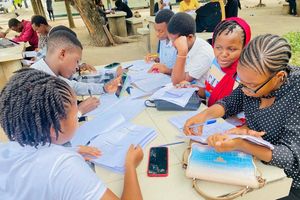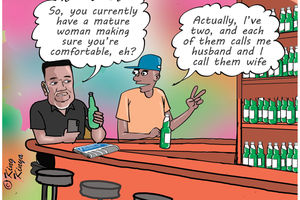Prime
Opposition unite for electoral reforms, split on polls boycott

Leaders of various political parties at a meeting held at the Tanzania Centre for Democracy in Dar es Salaam. PHOTO | TCD
What you need to know:
- The political party stakeholders generally seek more reforms to guarantee free and fair elections, given past experiences
Dar es Salaam. Opposition parties have reached a consensus on the need for electoral reforms and participation in the October 2025 General Election, distancing themselves from Chadema’s “No Election” campaign.
The announcement was made during a meeting at the Tanzania Centre for Democracy (TCD) on 2 April 2025, where key areas for reform were discussed to ensure free, fair and credible elections.
Representatives from Chadema, the ruling Chama Cha Mapinduzi (CCM), CUF, NCCR-Mageuzi, and ACT-Wazalendo attended the TCD meeting in Dar es Salaam.
All parties, except CCM, expressed support for significant electoral reforms ahead of this year’s general election, though they refrained from endorsing a boycott.
Briefing the media after the meeting, TCD chairman Tundu Lissu said that the opposition parties were committed to meaningful constitutional, legal and institutional reforms in time for the elections.
The elections will vote for the union and Zanzibar presidents, members of Parliament, members of the Representatives Council, and councillors for mainland Tanzania and Zanzibar.
“The government has made no substantial reforms through legal amendments,” Mr Lissu said, criticising recent changes such as renaming the electoral body to include the word ‘independent’ as merely cosmetic.
Mr Lissu confirmed that TCD would convene another meeting on 14 April 2025 to finalise the specific reform proposals to be presented to President Samia Suluhu Hassan.
Key issues include restructuring the electoral commission, procedures for voter registration, the nomination process for candidates, electoral campaigning, the use of ethical guidelines for candidates, and the role of party agents in voting, counting, and results declarations.
Other critical issues to be discussed include dispute resolution processes and the involvement of security forces in elections.
“We will reach a collective position on the reforms by 14 April and present proposals to President Samia Suluhu Hassan for dialogue and decision-making,” added Mr Lissu.
Mr Lissu, who doubles as Chadema’s national chairman, reiterated that the TCD was created to foster dialogue among political parties with differing views, stressing the importance of communication over confrontation.
"This is why TCD exists—if we don’t talk, we will end up fighting,” said Mr Lissu, quoting Winston Churchill’s famous World War II maxim: “It is better jaw-jaw than war-war,” advocating for dialogue instead of conflict.
At a recent Eid Baraza, President Hassan welcomed dialogue to address the shortcomings of past elections, particularly the widely disputed 2024 local government polls.
However, on the previous day, Mr Lissu reiterated Chadema’s ‘No Reform, No Election’ stance, emphasising that the decision, approved by the party’s Central Committee in December 2024 and subsequently got the endorsement of the opposition party’s General Congress was a serious commitment.
“If someone was joking about the decision, unfortunately, I wasn’t. The National Executive Council and the Congress endorsed the decision,” he told the party’s leadership aspirants who gathered here.
“We want reforms, and we urge our members running for MP or councillor positions to advocate for them. Reform will enable us to elect more constituency MPs and councillors, thereby increasing our chances of gaining more special seats,” he added.
Speaking yesterday, ACT Wazalendo’s Vice Chairman (Mainland), Isihaka Mchinjita, reiterated the party’s call for urgent electoral reforms to restore the value of citizens’ votes, which he claimed had been diminished over the past three election cycles.
“We want change. District Executive Directors must be excluded, and the process for appointing members of the Independent National Electoral Commission (INEC) should be more transparent and legally compliant,” said Mr Mchinjita.
NCCR-Mageuzi vice chairman Joseph Selasini said that political party secretaries would review the proposed resolutions before meeting President Hassan for further discussions on the reforms.
CUF secretary-general Husna Abdalla Mohammed raised concerns over the fairness of elections, pointing to issues such as the disqualification of qualified candidates and the mishandling of election materials.
A political science and public administration lecturer at the University of Dodoma (Udom), Dr Paul Loisulie, suggested that “No Reform, No Election” was ultimately about creating a platform for dialogue rather than confrontation.
"It is a good decision because reforms will lead to more competitive elections, unlike the current system that benefits CCM. Failure to agree on reforms could lead to serious problems for Tanzania’s democracy,” he said.
A political science lecturer at the State University of Zanzibar (Suza), Prof Ali Makame Ussi, suggested that despite past complaints, particularly regarding the 2024 local government elections, opposition parties should trust the wisdom of dialogue under the president’s leadership.
He cautioned that opposition grievances are often aimed at galvanising their base and should not always be seen as indicative of systemic issues.
“Reforms should focus on addressing the real issues identified in previous elections to ensure a better democratic process,” he said.




